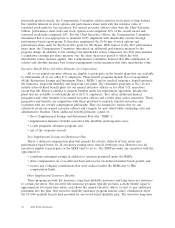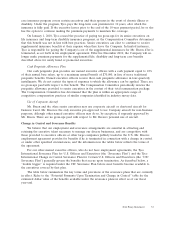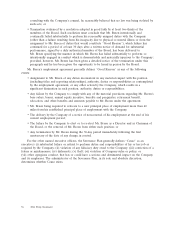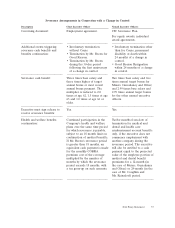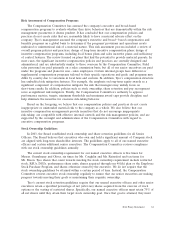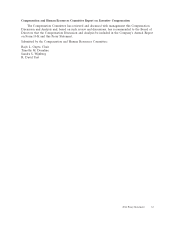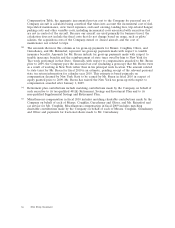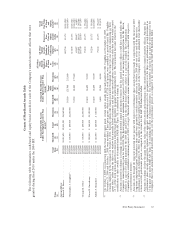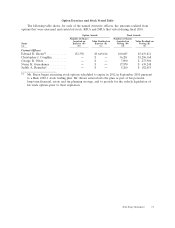ADT 2010 Annual Report Download - page 70
Download and view the complete annual report
Please find page 70 of the 2010 ADT annual report below. You can navigate through the pages in the report by either clicking on the pages listed below, or by using the keyword search tool below to find specific information within the annual report.retain at least 25% of subsequently acquired net shares received upon exercise or vesting for a
minimum period of three years. Named executive officers who are 62 or older may dispose of 50% of
their accumulated holdings. All of the named executive officers remained in compliance with the stock
ownership guidelines in fiscal 2010.
Pay Recoupment Policy
Tyco’s pay recoupment policy currently provides that, in addition to any other remedies available
to it and subject to applicable law, if the Board or any Compensation Committee of the Board
determines that any annual or other incentive payment, equity award or other compensation received
by a Senior Officer resulted from any financial result or operating metric that was impacted by the
Senior Officer’s fraudulent or illegal conduct, the Board or a Board Committee may recover from the
Senior Officer that compensation it considers appropriate under the circumstances. The Board has the
sole discretion to make any and all determinations under this policy. The Board expects to update the
pay recoupment policy when the regulations mandated by the Dodd-Frank Act are implemented by the
Securities and Exchange Commission in the next year. At a minimum, the policy will comply with the
Dodd-Frank Act and related regulations, but will likely retain features of the existing policy that are
more expansive than the requirements of the Act.
Insider Trading Policy
The Company maintains an insider trading policy, applicable to all employees and directors. The
policy provides that the Company’s personnel may not buy, sell or engage in other transactions in the
Company’s stock while aware of material non-public information; buy or sell securities of other
companies while aware of material non-public information about those companies that they become
aware of as a result of business dealings between the Company and those companies; disclose material
non-public information to any unauthorized persons outside of the Company; or engage in transactions
in puts, calls, cashless collars, options or similar rights and obligations involving the Company’s
securities, other than the exercise of any Company-issued stock option. The policy also restricts trading
for a limited group of Company employees (including named executive officers and directors) to
defined window periods that follow our quarterly earnings releases.
Our insider trading policy also permits executives to enter into Rule 10b5-1 trading plans during
open window periods. As previously disclosed, Mr. Breen entered into such a plan in August 2010 with
respect to 1.8 million stock options that are scheduled to expire in 2012. Mr. Breen entered into the
plan as part of his personal long-term financial, estate and tax planning strategy, and to provide for the
orderly liquidation of his stock options prior to their expiration. Certain of our other senior executives,
who also hold stock options scheduled to expire in the next several years, may also enter into similar
plans.
Tax Deductibility of Executive Compensation
Section 162(m) of the Internal Revenue Code imposes a limit of $1.0 million on the amount of
compensation that can be deducted by Tyco with respect to each named executive officer (other than
Mr. Coughlin, our Chief Financial Officer), unless the compensation over $1.0 million qualifies as
‘‘performance-based’’ under federal tax law. It is our policy to structure compensation arrangements
with our named executive officers to qualify as performance-based so that compensation payments are
deductible under U.S. federal tax law, unless the benefit of such deductibility is outweighed by the need
for flexibility or the attainment of other corporate objectives. Potentially non-deductible forms of
compensation include payments in connection with the recruitment and retention of key employees,
base salary over $1.0 million, discretionary bonus payments and grants of time-based RSUs. In addition,
stock options granted to Mr. Breen when he was hired in July 2002 may not qualify as performance-
based compensation under Section 162(m).
62 2011 Proxy Statement


